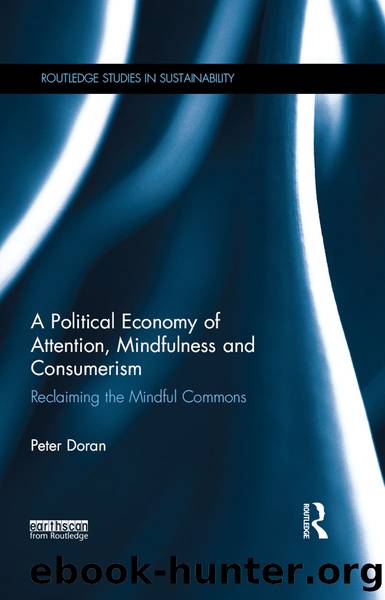A Political Economy of Attention, Mindfulness and Consumerism: Reclaiming the Mindful Commons by Peter Doran

Author:Peter Doran [Doran, Peter]
Language: eng
Format: epub
Tags: Public Policy, Ecology, Political Science, Nature, Environmental Policy
ISBN: 9781317743422
Google: xAgqDwAAQBAJ
Goodreads: 35583588
Publisher: Routledge
Published: 2014-12-22T00:00:00+00:00
Relation to the self: the first moment of opposition
Mindfulness training is associated with practices such as Zen Buddhist meditation and, in therapeutic or advanced research settings, mindfulness-based cognitive behaviour therapy (MCBT). Studies of practices pursued by individuals and communities engaged in mindfulness training can contribute new insights to our debates on the relationship between consumerism and well-being, because they not only call attention to the role of subjective states and their importance for articulating new measures of quality of life (Layard 2005; Alkire 2009), they also demonstrate that practitioners can significantly influence their subjective states and, thereby, their way of knowing and relating to the âworldâ, including their relationship to consumption.
Michel Foucault (1999) took a practical interest in Zen Buddhism, a contemporary practice of askÄsis, and wrote extensively on ancient Greek and Christian practices, concluding that âcare of the selfâ can be a form of resistance to forms of biopolitical power, which have come to structure ways of perceiving space and time, bodies and minds.
Mindfulness training and practices are now the regular subject of in-depth studies in neuroscience and branches of the psychological sciences. Studies of practices pursued by individuals and communities engaged in mindfulness training can contribute new insights to hedonic research on subjective well-being and the argument that a decoupling of consumption and an improvement of wellbeing is possible. Mindfulness practices demonstrate that practitioners can significantly influence their subjective states (askÄsis) and, thereby, their way of knowing and relating to the material world in ways that appear to match emerging societal demands for reduced ecological impacts alongside enhanced subjective well-being or flourishing.
The current era of economic, social and environmental uncertainty has given new prominence to a number of debates that converge around the theme of sustainable consumption. Questions about the effectiveness of traditional measures of national economic output such as gross national product or gross domestic product, the ambivalent relationship between consumerism and life satisfaction, and improvements in our ability to measure âhappinessâ and âwell-beingâ are placing the quality of subjective experience centre stage.
I want to frame mindfulness training as an opening to contemporary forms of askÄsis (Foucault 1985, 1987; McGushin 2007) in the context of biopolitics as consumerism. The governmentalization of lifestyles implies a shaping of desire and morality so that people want to do what they believe is good for them according to a prescribed biopolitical logic. Mindfulneness is associated with the cultivation of enhanced states of concentration, awareness and moment-by-moment intentionality. In some settings it is also associated with alternative materialist and embodied systems of knowledge/discipline; and an articulation of individual freedom that might be reconciled with notions of sufficiency and limits, and thus potentially, with support for public choices compatible with sustainable consumption.1
As lifestyles are already being reshaped in preparation for a low-carbon future (Lipschutz 2009: 3) it is imperative that we keep the door open to research and insights that not only direct our attention to alternative governmentalities in pursuit of sustainable development, renewable energy services and green products, but direct our attention to the quality of attention itself and the prospect of a new materialism.
Download
This site does not store any files on its server. We only index and link to content provided by other sites. Please contact the content providers to delete copyright contents if any and email us, we'll remove relevant links or contents immediately.
International Integration of the Brazilian Economy by Elias C. Grivoyannis(106932)
The Radium Girls by Kate Moore(12003)
Turbulence by E. J. Noyes(8008)
Nudge - Improving Decisions about Health, Wealth, and Happiness by Thaler Sunstein(7678)
The Black Swan by Nassim Nicholas Taleb(7088)
Rich Dad Poor Dad by Robert T. Kiyosaki(6578)
Pioneering Portfolio Management by David F. Swensen(6275)
Man-made Catastrophes and Risk Information Concealment by Dmitry Chernov & Didier Sornette(5981)
Zero to One by Peter Thiel(5767)
Secrecy World by Jake Bernstein(4727)
Millionaire: The Philanderer, Gambler, and Duelist Who Invented Modern Finance by Janet Gleeson(4448)
The Age of Surveillance Capitalism by Shoshana Zuboff(4267)
Skin in the Game by Nassim Nicholas Taleb(4224)
The Money Culture by Michael Lewis(4174)
Bullshit Jobs by David Graeber(4162)
Skin in the Game: Hidden Asymmetries in Daily Life by Nassim Nicholas Taleb(3973)
The Dhandho Investor by Mohnish Pabrai(3744)
The Wisdom of Finance by Mihir Desai(3720)
Blockchain Basics by Daniel Drescher(3565)
